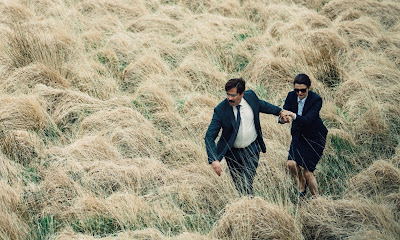The
Lobster (2016): Written by Yorgos Lanthimos and
Efthymis Filippou, directed by Yorgos Lanthimos. Starring:
Colin Farrell, Rachel Weisz, Jessica Barden, Olivia Colman, Ashley Jensen,
Ariane Labed, Angeliki Papoulia, John C. Reilly, Lea Seydoux, Michael Smiley,
and Ben Whishaw. Running Time: 118 minutes.
Rating:
3/4
The Lobster might be one of the coldest,
hardest films of 2016, and although we may still have a few months to go, I
highly doubt anything will top it (knock on wood). It is a dark, dark, DARK satire of dating and
romance in the 21st-century, so on-point at its best that it will be
far too uncomfortable viewing for most. Yet
that, perhaps, makes it all the more necessary.
Colin
Farrell stars as David, living in a world where constantly being in a
relationship isn’t just socially desired, it’s legally mandated. Those unfortunate enough to find themselves
on the receiving end of a breakup (or even the opposite end of a spousal
death!) must immediately check themselves into a hotel that specializes in
coupling people back up as soon as possible.
There is a 45-day time limit to your efforts, and if, by the end of that
time, you have failed to find your soulmate, you are literally turned into an
animal (but to be fair, they DO let you choose which one) and let loose in a
nearby forest.
We
don’t know how we got here, how long things have been like this, or even how
the technology to turn people into other animals exists. It simply is, and the audience has to quickly
play catchup to figure out what the characters already know, because there are
a lot of rules that have to be followed, and the punishments the hotel metes
out for those who don’t play along can be truly brutal. One of the rules, perhaps the most galling
(and ultimately destructive), is that in order to become a couple, two people
must have at least one identifiable skill, or interest, or physical/emotional
trait. If not, it won’t be accepted,
because clearly there can’t be love if there are no surface similarities
between two people, right?
The
ultimate cost of all this quickly becomes apparent- in a world where love is
commodified and packaged down to people hooking up over having just a single
thing in common, there can be no passion.
No real joy or sadness. Just
endless calculation over what the right move is that will save you from “The
Transformation Room.” There is no subtlety
or understanding of symbolism in speech- no one in the hotel can afford
it. Conversations are just repeated
litanies of trivia tidbits, and everyone speaks in a monotone, tilted, highly
formal manner, with just a hint of desperation around the edges for those whose
time is running out.
We
get a small idea of what sort of larger world might exist outside the hotel in
the second act- when David finally loses his cool and flees the hotel (after a
plot twist that is genuinely bone-chilling), he encounters a group of rebels
living in the woods called the Loners, led by a terrifying Lea Seydoux. At first, you might be inclined to assume
that safety and acceptance have been found, and David can take a deep breath
and relax. But you would be wrong, as
the Loners turn out to be just as demanding and strict in keeping people alone
and separated from each other as “regular society” is in forcing people
together. It’s a powerful and apt
reminder that rejection of one extreme doesn’t automatically lead to
moderation- it can just as easily lead one to embrace another, equally
destructive, extreme.
The
film’s greatest strength is that it unflinchingly commits to these extremist
principles it sets up in the beginning, drawing them to the farthest conclusion
possible. This may very well kill for
the film for many viewers. There is no emotional
shift, no deviation from the lifeless tone of every bit of dialogue; it fits
with the environment the movie seeks to create, but if you find yourself tiring
of it early on it may prove impossible to appreciate anything else as a
result. Like many needed and remarkable
works of art, the film raises a host of prickly, uncomfortable questions and
leaves little suggestion that a reassuring answer can be found. I wonder if the film doesn’t tip its hand too
much at times, leaning wholly into existential despair and thus becoming lost
in its own bleakness, but I can’t deny that much of it has stayed with me, for
better or worse, and I can certainly never fault a film for that.
-Noah Franc


